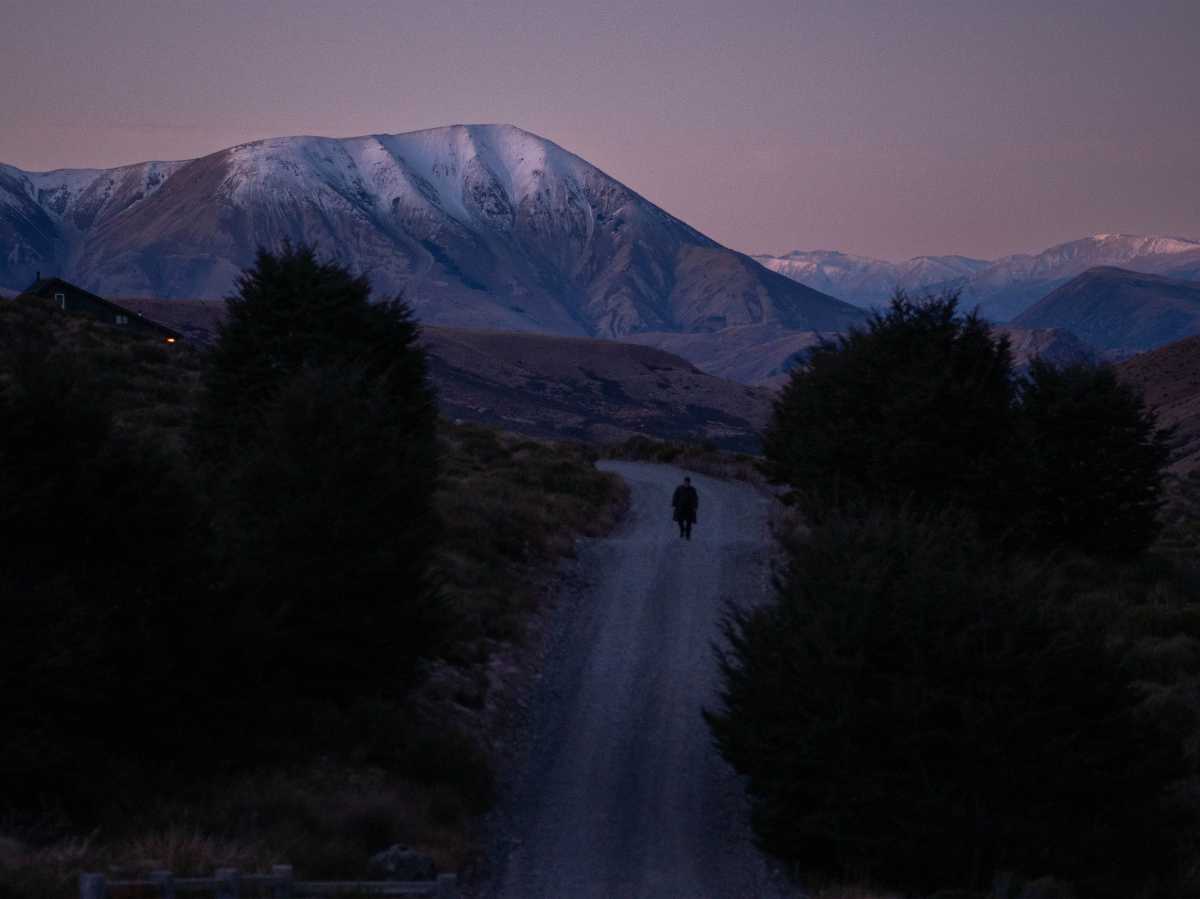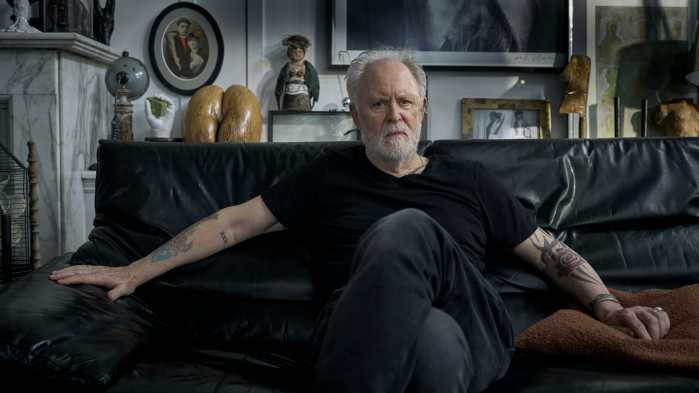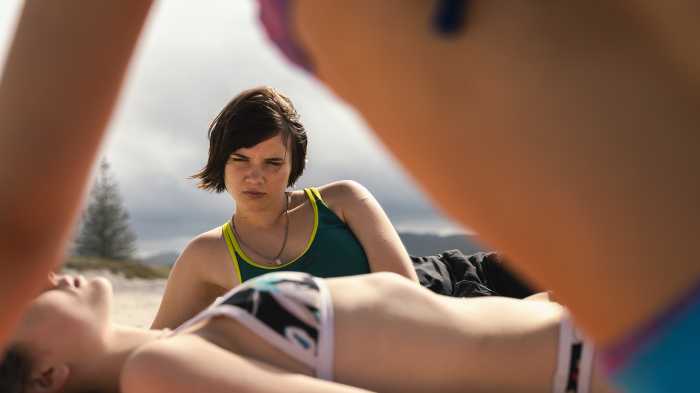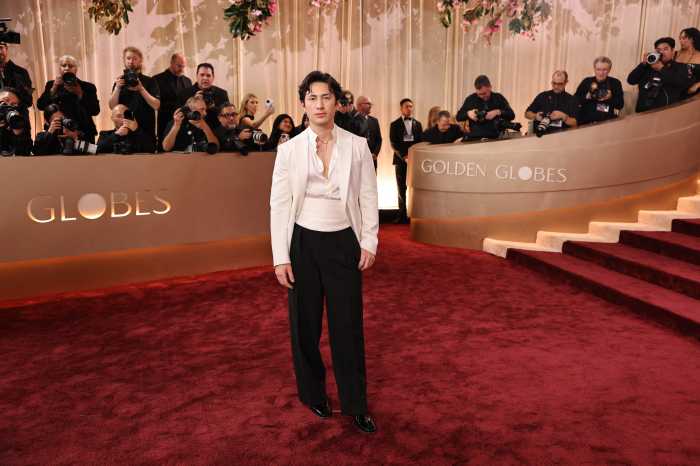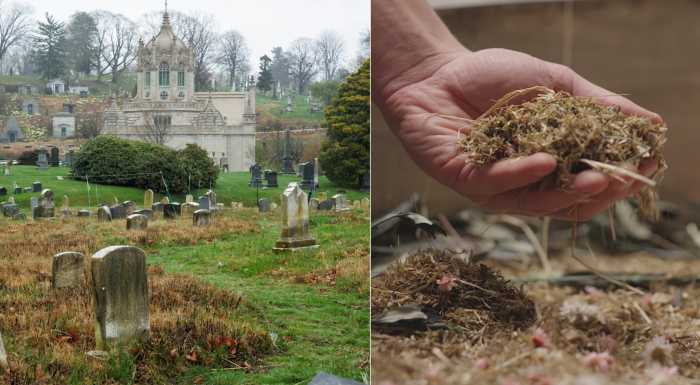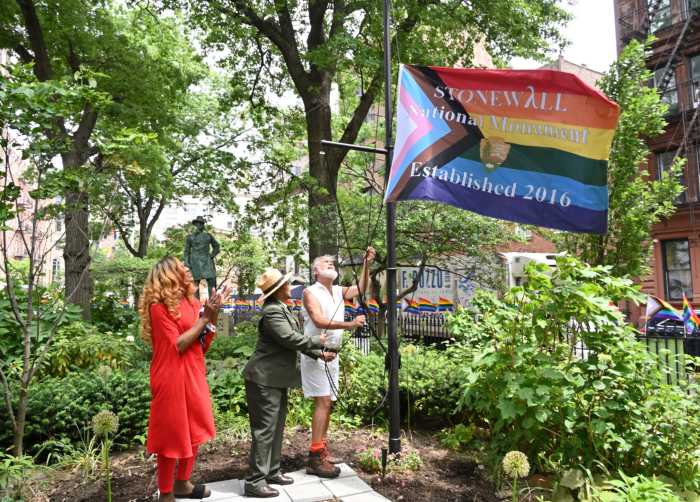Out gay filmmaker Samuel Van Grinsven’s (“Sequin in a Blue Room”) sophomore feature, “Went Up the Hill,” is an impressive, intriguing, and ethereal queer ghost story.
Jack (Dacre Montgomery from “Stranger Things”) arrives at a funeral for his estranged mother, Elizabeth, and meets her wife, Jill (Vicky Krieps, playing lesbian again after “Hot Milk” earlier this summer). Jack claims that Jill invited him, but Jill explains that she did not know Elizabeth had a son. That’s eerie, and it is later revealed that Elizabeth is able to communicate through both Jack and Jill by possessing them at different times.
When Jack stays with Jill after the funeral, both widow and son process their grief and confront past traumas and abuse. A scene of Jill giving Jack a bath alternates between tense and tender because Elizabeth embodies Jill. There is also an arresting scene where Jack — possessed by Elizabeth — has sex with Jill.
This gorgeously lensed film is a heady mood piece that demands unpacking. In a recent interview, Van Grinsven spoke with Gay City News about making “Went Up the Hill.”
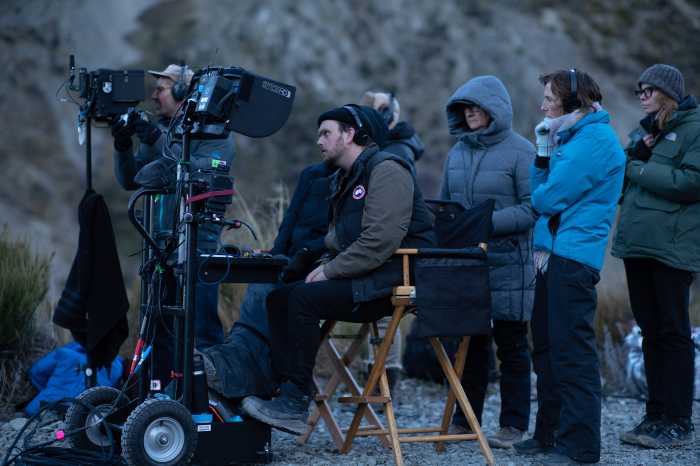
“Went Up the Hill” has an aloof, almost detached tone and texture to it. Can you talk about creating the cold and gray feel of the film? It’s very palpable.
Thematically, the film is really about control. It’s unique in that it’s a three-hander told with two actors. That third character is the embodiment of that theme of control. Because [Elizabeth] is not physically on the screen, and the audience doesn’t meet her in the flesh, it was about how do we imbue her sense of control and her history into the house, into the textures, and into the landscape? We found it in the color palette which came from the remote New Zealand landscape. We locked it down with bone and browns.
Likewise, there is a rigor to your film’s style with the closeups and the use of silence and music. Can you describe your visual and aural approach to telling the story in the way you did? It is haunting.
I wanted it to feel inescapable in a lot of ways. I wanted you to feel that you stepped into a conversation you weren’t invited to, or that the people having it weren’t aware you could hear them. It made sense that these characters living in a remote house wouldn’t speak very loudly. The actors leaned into quiet performances, which invited the camera in closer. We play with a ghostly theme of possession in the film, but there is no artifice, no visual effects, or costuming to create the “ghost” character. It’s all in the actors’ performances. Vicky and Dacre created these minute differences between themselves as their core character and this ghost character. That meant coming in intimately and letting the audience see the actors shift personas with just the muscles in their face.
There is some ambiguity at play in the narrative, as the first episode where Jack is “possessed” by Elizabeth can be read as a dream. As the film progresses, viewers learn more about the ghostly dynamics at play and recalibrate. How did you develop the “ghost” story?
We wanted to keep a sense of transgression alive. That is what is at play in the film, and the way the script is written, it feels like two kids sneaking into each other’s rooms at night and behaving as if there are no adults around. The sense of transgression becomes palpable. The actors decided to play it not literally as in, “I’m possessed,” but in their heads. It was emotionally playable for them — Jack and Jill are creating a mother/wife character for each other rather than a literal ghost. I hope it feels more natural and nuanced than if we leaned into the effects.
Jack feels his mother’s tenderness when Jill gives him a bath. Jill feels her wife’s love during a sex scene with Jack. What inspired these moments?
It’s that transgression element again. The characters establish loose ground rules, and they revisit how things work when they become [Elizabeth]. They test the boundaries. That plays with the idea of “unearned intimacy.” I don’t mean the sexual side of intimacy. Jack hasn’t had key foundational childhood memories — like being bathed by his mother. For Jill, she struggles with knowing her wife is back, but in male form. She feels the familiar touch of someone who knows you like only your partner can. It’s a shared secret, like the way they trace your back. It is another way [Elizabeth] communicates and says, “It is actually me. Only you could know this.”
I appreciated that homosexuality “runs in the family,” as one character acknowledges. Can you discuss why you made both Jill and Jack queer?
Jack was queer from the get-go. I don’t write a lot of straight characters. Had both leads been heterosexual, the audience would be ingrained with expectations around that with a triangle ghost film. If you played towards or against those expectations, they would still be there. Would she fall in love with her stepson? Would he be attracted to his mother in a sexual way because it is not actually his mother? The queer dynamics remove that and the story functions as what it is. Jack didn’t know about his mother being queer. Knowing he has that in common with her creates an instant connect that is quite nice.
Water is a symbol of cleansing and purification, but also renewal, rebirth, and transformation. Can you talk about the symbolism in the film? It’s not just that the characters are fetching a pail of water.
The connection to the nursery rhyme is definitely a part of it. [Laughs]. I was interested in water in a “sound” sense, how it restricts things like communication and adds stakes to life. Humans feel weaker in water. There is a beauty and a danger to it. There is also its connection to womb and birth. The sound design in the literal water scenes — the bathtub and the lake and how sound functions in the house — is always connecting us to this character who is never on screen.
“Went Up the Hill” is about grief and letting go but also grappling with trauma. Can you talk about exploring those themes?
I was interested in this idea of two characters who are burying the wounds of trauma and come into it believing that this third character can heal them. Across the film we establish why these two people are seeking [Elizabeth] so heavily. It has to do with the fact that they are displaced from their birth family. That felt truthful and important to me to explore with a lesbian and a gay character — the way the queer community can find family with each other.
Do you believe in ghosts? Have you had a ghostly encounter?
I think I do. I don’t know that I did at the outset of the film. That was interesting to me. I’ve always been fascinated by it. There were a lot of moments on this film that are really eerie — sound equipment going crazy, or things falling down while we shot the possession scenes. It was uncanny and unnerving.
I see “ghosts” when I see the visage of my late father on a stranger.
Visage was a big part of us writing a film. I found that to be one of the most beautiful things about grief — whether you see a relative or a friend you’ve lost. When someone has the same laugh or eyebrows, or whatever it is, the ways we seek that out and recreate it, or try to hold on to someone we’ve lost, those reminders were a big part of how we came up with our version of possession in the film. There was also something distinctly gothic about returning to New Zealand and making a film in that landscape.
“Went Up the Hill” | Directed by Samuel Van Grinsven | Opening August 15 at the IFC Center | Distributed by Greenwich Entertainment.

